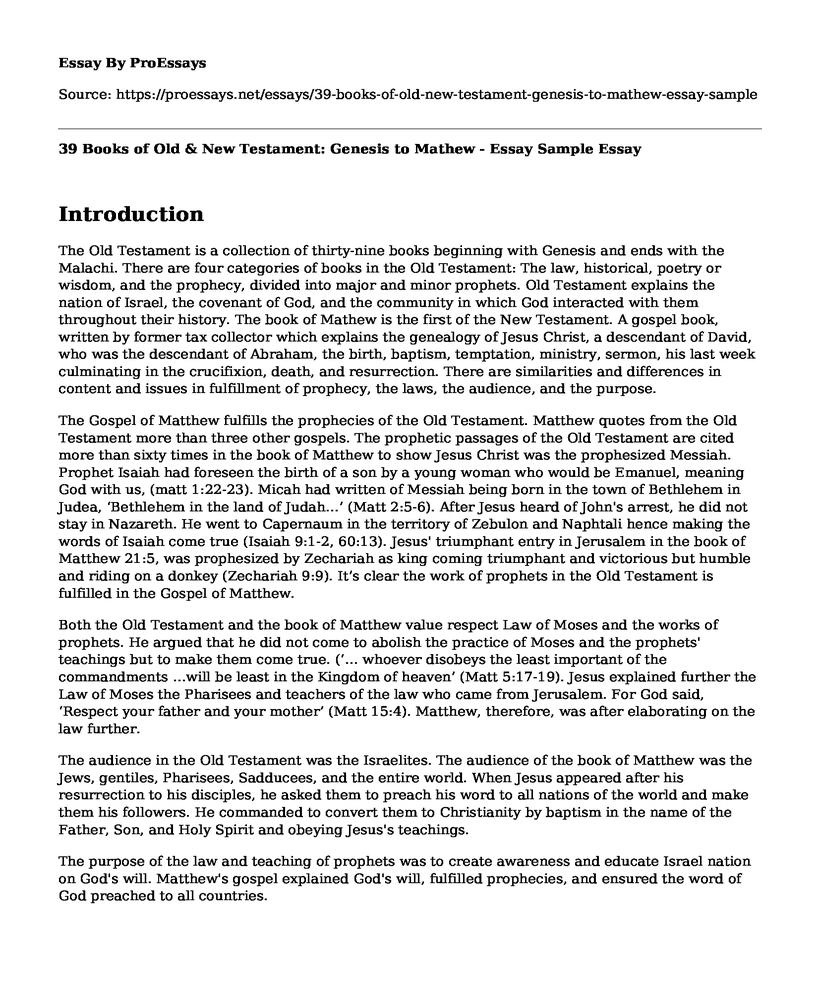Introduction
The Old Testament is a collection of thirty-nine books beginning with Genesis and ends with the Malachi. There are four categories of books in the Old Testament: The law, historical, poetry or wisdom, and the prophecy, divided into major and minor prophets. Old Testament explains the nation of Israel, the covenant of God, and the community in which God interacted with them throughout their history. The book of Mathew is the first of the New Testament. A gospel book, written by former tax collector which explains the genealogy of Jesus Christ, a descendant of David, who was the descendant of Abraham, the birth, baptism, temptation, ministry, sermon, his last week culminating in the crucifixion, death, and resurrection. There are similarities and differences in content and issues in fulfillment of prophecy, the laws, the audience, and the purpose.
The Gospel of Matthew fulfills the prophecies of the Old Testament. Matthew quotes from the Old Testament more than three other gospels. The prophetic passages of the Old Testament are cited more than sixty times in the book of Matthew to show Jesus Christ was the prophesized Messiah. Prophet Isaiah had foreseen the birth of a son by a young woman who would be Emanuel, meaning God with us, (matt 1:22-23). Micah had written of Messiah being born in the town of Bethlehem in Judea, ‘Bethlehem in the land of Judah…’ (Matt 2:5-6). After Jesus heard of John's arrest, he did not stay in Nazareth. He went to Capernaum in the territory of Zebulon and Naphtali hence making the words of Isaiah come true (Isaiah 9:1-2, 60:13). Jesus' triumphant entry in Jerusalem in the book of Matthew 21:5, was prophesized by Zechariah as king coming triumphant and victorious but humble and riding on a donkey (Zechariah 9:9). It’s clear the work of prophets in the Old Testament is fulfilled in the Gospel of Matthew.
Both the Old Testament and the book of Matthew value respect Law of Moses and the works of prophets. He argued that he did not come to abolish the practice of Moses and the prophets' teachings but to make them come true. (‘… whoever disobeys the least important of the commandments …will be least in the Kingdom of heaven’ (Matt 5:17-19). Jesus explained further the Law of Moses the Pharisees and teachers of the law who came from Jerusalem. For God said, ‘Respect your father and your mother’ (Matt 15:4). Matthew, therefore, was after elaborating on the law further.
The audience in the Old Testament was the Israelites. The audience of the book of Matthew was the Jews, gentiles, Pharisees, Sadducees, and the entire world. When Jesus appeared after his resurrection to his disciples, he asked them to preach his word to all nations of the world and make them his followers. He commanded to convert them to Christianity by baptism in the name of the Father, Son, and Holy Spirit and obeying Jesus's teachings.
The purpose of the law and teaching of prophets was to create awareness and educate Israel nation on God's will. Matthew's gospel explained God's will, fulfilled prophecies, and ensured the word of God preached to all countries.
Conclusion
In conclusion, Matthew elaborates on the Law of Moses and the fulfillment of prophecies. The gospel serves as a link to the Old Testament and the New Testament. It forms the foundation of Christianity as well as a better understanding of the Old Testament.
Cite this page
39 Books of Old & New Testament: Genesis to Mathew - Essay Sample. (2023, Aug 22). Retrieved from https://proessays.net/essays/39-books-of-old-new-testament-genesis-to-mathew-essay-sample
If you are the original author of this essay and no longer wish to have it published on the ProEssays website, please click below to request its removal:
- Understanding Islam
- Unity, Relativity and Exclusivity in Christianity
- Paper Example on Importance of Learning How to Be a Follower
- Annotated Bibliography: Christianity
- Healing and Autonomy and Christian Worldview Paper Example
- Use of Hijab Among Muslim Women: Annotated Bibliography
- God's Word: Exploring Theology's Meaning - Essay Sample







